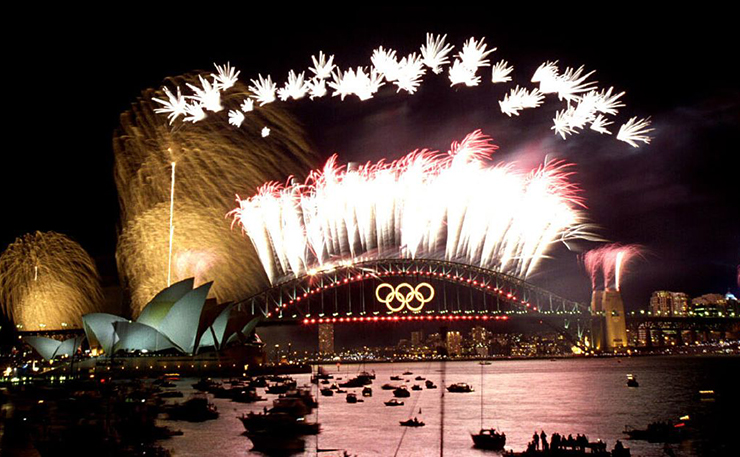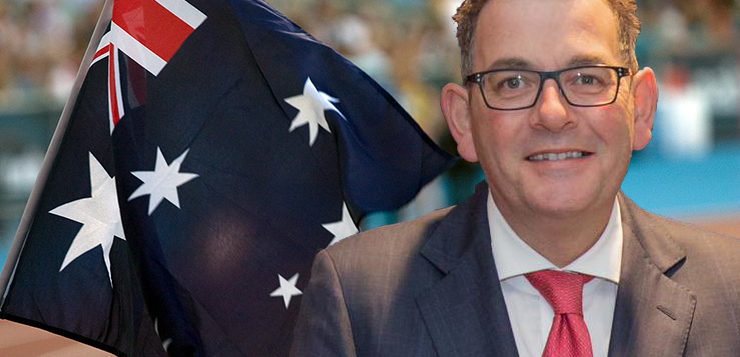When Victorian Premier Daniel Andrews announced last month that his state was walking away from hosting the 2026 Commonwealth Games, you could be forgiven for believing that children had been slaughtered, puppies had been eaten and that Australian life as we know it would never be the same again.
At least, that’s the impression you might have gotten if you’re unfortunate enough to consume mainstream Australian news. Turns out that being whipped by the media for cancelling a Comm Games more closely resembles being flogged with a handful of fairy floss, rather than what Channel 10 newsreader Sandra Sully might have you believe.
“Australia is tonight feeling the shame of the international sporting world, and it’s all thanks to Victoria,” Sully declared in a dramatic lead-in for the nightly news.
That’s quite a statement, even if it does sound like it was written by a teenager prone to using the words ‘literally’ and ‘like’ in, like, literally every sentence.
Firstly, if Australia really was ‘feeling the shame of the international sporting world’, then it would have been because of something we did with the ‘international sporting world’. That’s the beautiful thing about shame – it’s personal, you can’t feel someone else’s.
Secondly, most of the ‘international sporting world’ couldn’t give a flog about the Comm Games, and that’s because most of the ‘international sporting world’ has absolutely nothing to do with the Comm Games.
Exhibit A: China, population 1.4 billion people; or the United States, 340 million; or Indonesia, 277 million; or Pakistan, 240 million; or… you get the idea. Of the roughly eight billion people in the world, only about 2.6 billion of them actually live in a Commonwealth country, and only then thanks in large part to India, which makes up more than 60 per cent of its population.
And it’s worth acknowledging: if India could get out of the Commonwealth tomorrow, then it would. The only reason it’s still in is courtesy of a very shitty deal it signed in 1949 to gain independence (from a nation that had invaded it, occupied it and brutalised it). Called the ‘London declaration’ the deal commits India to accepting the British Sovereign as a “symbol of the free association of its independent member nations and as such the Head of the Commonwealth”… honestly, only the Windsors could come up with something so perverse).
But back to the Comm Games… much as the Australian media would like you to believe the ‘international sporting world’ was ‘shocked and chagrined’ by Australia’s decision to stop digging a multi-billion dollar hole in which to pour money, pretty much no-one but the Australian media (and a few politically obligated automatons) gave two figs.
Hence, the world got back to normal. All the dead children were buried; people stopped eating puppies… and then a few weeks later the province of Alberta, Canada announced it was also abandoning its bid for the 2030 Comm Games, more or less citing the very same reason as Victoria… namely, you’d have to be a mug to host it.

Suddenly, Dan Andrews looked like the smartest man in the room, although apparently no-one told Sky News, because just one day after the ‘bomb from Alberta’, Sky News reported the sort of world exclusive that only a news organisation determined to be Australia’s answer to Fox News, but with even more unhinged and lightweight commentators, could take seriously: Victorian taxpayers might be “on the hook” for up to $4.5 million in compensation to workers axed as a result of the cancelled contract.
No shit, Sherlock.
Notwithstanding the fact that it’s Sky News making the claim – so, you know, it might not actually be true – a $4.5 million slug to the Victorian taxpayer is 100 times better, literally and figuratively, than what they would have copped if the Games had gone ahead.
That is to say, the blow out to the Games’ budget was in the BILLIONS of dollars. Spending $4.5 million to get rid of it, in context, looks like the deal of the century.
The Comm Games is the ultimate sporting White Elephant, no pun intended, and it’s been that way since its Inception in 1930.
Way back then, countries that hosted did so out of a sense of Imperial obligation. But as the century wore on, organisers somehow convinced themselves that it was a special ‘honour’ for nations to spend their own money to prop up a fading colonial empire. So obviously, they made suckers bid for it.
In 1966, the Games were held in Kingston after Jamaica ‘won the hosting rights’ over Scotland and Rhodesia. Christchurch beat Melbourne to host the 1974 games, but the bidding process had already started to derail. Brisbane won the 1982 Games by default after Lagos, Kuala Lumpur and Birmingham all pulled out before the vote was held. In other words, in a game that very closely resembled pass the parcel (but the parcel is actually a ticking bomb) Queenslanders were left holding the can.
And then, everything changed in 1984. That was when the organising committee of the Los Angeles Olympics – the flashy, competent cousin of the Comm Games – was forced to make use of existing facilities and attract corporate funding, rather than just lean on the taxpayers of California to foot the bill. In the end, the 1984 Olympics made a staggering $223 million profit – huge money at the time, and previously unthinkable. Since then, governments all around the word have convinced themselves that they too can turn a huge profit while promoting their city on the world stage. And it rarely happens.
Seoul (1988) and Barcelona (1992) managed to deliver modest returns, as did Atlanta in 1996. And then along came Sydney 2000, the first of the really, truly enormous taxpayer funded black holes.
Sydney’s Olympic Games costs taxpayers about $3 billion – something we boasted about at the time – and the event lost more than $2 billion overall. While few would argue it wasn’t a special moment for the country, debate still rages today about whether or not there was ever a net financial gain, with some of the more savage modelling suggesting it created an overall decline in consumption.

This was due in part to the fact much of the sporting facilities in which we proposed to hold the Games didn’t exist when we won the right to host them. Stadium Australia – which will host the Word Cup finals – was a toxic waste ground.
And in case you missed it, the regional model Victoria was planning to use – throwing stupid amounts of money at currently non-existent infrastructure and stadiums – is the model Sydney started rolling out three decades ago, when everything was cheaper and there wasn’t a global cost of living crisis gripping the world.
If you still have any doubt about the lame duck nature of the Comm Games, then consider this: the very next Games after the financial razzle dazzle of the 1984 LA Olympics was Edinburgh 1986. It also happened to be the first Comm Games to officially gouge an enormous hole in the public purse.
At the time, British Prime Minister Margaret Thatcher, fresh from her glorious 74-day war in the Falklands, had refused to severe ties with South Africa, despite a global push against Apartheid. As a result, 32 of the eligible 59 countries – i.e. most of Africa and virtually an country that homes people of colour – boycotted, leaving the Edinburgh Games in tatters, not to mention with a huge financial hole.
Well-known publisher Robert Maxwell – the Rupert Murdoch of his day – came to the rescue, promising more than two million pounds in assistance. All thre organising committee had to do was name his as Chairman.
They did exactly that, but true to form Maxwell never came up with the cash. Instead, he fleeced taxpayers, just like he did his own workers (Maxwell stole hundreds of millions of dollars from their pension funds).
In an almost perfect metaphor for the indignities the Comm Games would ultimately suffer, Maxwell died quietly a few years later after falling off his mega-yacht while having a late night pee over the side. The boat was named after his daughter, Ghislaine Maxwell. You might remember her from such prison dramas as ‘20 years to life’ for helping her former boyfriend American tycoon Jefferey Epstein traffic under-age girls to sex pests like Prince Andrew, a longstanding Comm Games official.
Still want the Comm Games? Well consider this: Durban, South Africa had originally been awarded the rights to host the 2022 Comm Games, but was stripped of the ‘honour’ in 2017 over financial concerns. Imagine how busted-arse organisers have to be to be stripped of a Games that no-one else wants. Birmingham, which was slated to host in 2026, stepped in and agreed to host 2022 instead. Which meant no-one was hosting 2026.
Kuala Lumpur, Cardiff, Calgary, Edmonton and Adelaide all withdrew their bids, because they’re not stupid. Victoria apparently was, and stepped in at the last minute to host 2026.
Now they, and Canada in 2030 are out, because they wised up.
If that doesn’t spell the end of the Comm Games as an event, it most certainly should. But it probably won’t. The multi-billion question is who is going to be stupid enough to pick up the slack? It will almost certainly be a British city – who else is King Charles, the living, breathing embodiment of waning influence, going to be able to lean on to piss so much money up the wall?
Maybe he should try… Victoria, Australia? It wouldn’t be that hard to reboot things, because a month after the announcement we were pulling out, the Comm Games 2026 website remains up and active, in all its green and gold, taxpayer-sapping glory. Worse case scenario, we could stage one helluva circus.
Donate To New Matilda
New Matilda is a small, independent media outlet. We survive through reader contributions, and never losing a lawsuit. If you got something from this article, giving something back helps us to continue speaking truth to power. Every little bit counts.




